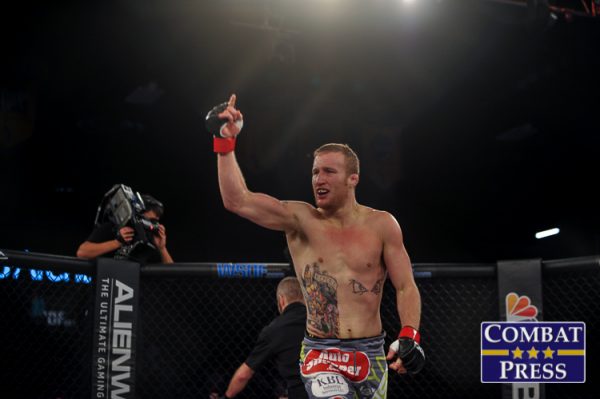In this MMA free-agency craze we are currently experiencing, many fighters are choosing to fight out their contracts and hit the open market. It has been very much publicized with guys from the UFC who have openly talked about fighting their way out of their contracts and testing their market value. The trend has caught so much steam that now even some of the guys from other promotions are talking about exploring this new MMA landscape.
It’s not just any random up-and-coming fighter testing the waters, especially from promotions like the World Series of Fighting. It’s the star fighters. It’s the ones the promotion has built from the ground up, investing a lot of time and money to make them a household name.
This is the reality of the situation for promotions like WSOF, which now finds itself with a lightweight champion — and arguably the company’s most popular fighter — who has openly stated that he will fight out the remainder of his contract and see how much other promotions are willing to spend for his services.
Overall, this is a great thing for the sport. It benefits the promotions because they might have a crack at signing a fighter they would have only dreamed of signing just a few years ago. The fighters, meanwhile, have the possibility to make more money, which has always been a hot-button issue in the sport.
However, in the case of the aforementioned WSOF lightweight champ, Justin Gaethje, it might not necessarily work out in his favor.
Let’s look at the pay scale the UFC generally has for its fighters. The top-tier guys are very well taken care of. We are talking millions of dollars per fight. Then, there are the ones that make very good money — $250,000 to $500,000. Those two tiers consist of a small amount of fighters compared to the close to 500 the UFC currently has under contract. Most of the roster is making less than $100,000 per fight, at least based on the released salaries, and that includes the Reebok money in some cases. Gaethje has repeatedly made around $100,000 while fighting under the WSOF banner.
While Gaethje is probably one of the most entertaining young fighters the sport has to offer, the UFC will most likely not offer him anything comparable to what the WSOF has paid him during his time there. Maybe Gaethje thinks the UFC will do anything in its power to sign one of the rising stars in the sport, but based on historic trends for the UFC, it’s unlikely the organization will break the bank on a guy like Gaethje. He is a very gritty and entertaining fighter, but one that could easily land in the middle of the pack in the UFC. The company very much knows this, too.
To be fair to the UFC, the company has paid guys quite well coming over from successful runs in other promotions. Hector Lombard, Eddie Alvarez and Anthony “Rumble” Johnson signed some pretty decent contracts when they entered the UFC from their respective former promotions. Gaethje can very easily be in the same class, but it is much harder to predict because of the opposition he has faced thus far in his career. Gaethje is a classic 30/30 guy — $30,000 to show and $30,000 win bonus — in the UFC’s eyes. Furthermore, he will be making the minimum in the Reebok sponsorship pay scale.
One possible big payday for Gaethje could come from Bellator, a promotion that seems to be throwing a lot of money around these days. But even Bellator has been very measured on exactly which guys it goes after. Judging from the signings new CEO Scott Coker has accomplished since taking over, Bellator is clearly going after guys who have a big, established following. These are not necessarily the best fighters in the world, but their name on a poster will put butts in the seats.
Does Gaethje fit that label? No. Not yet, at least. Bellator has gone after guys like Benson Henderson, who was the UFC lightweight champion and is tied with Frankie Edgar and B.J. Penn for most consecutive lightweight title defenses. The company also snagged Matt Mitrione, who has a decent following and was part of the most viewed season of The Ultimate Fighter to ever air (on Spike, the home of Bellator, no less). The list goes on and on, and yet Bellator failed to heavily pursue the best talent to hit the market in some time: Aljamain Sterling. Is Gaethje more of a commodity than Sterling? Most people would say no. Given their fighting styles, you can easily make the case that Sterling would be the better bargain because he is younger and has taken far less damage than Gaethje.
You can’t fault fighters like Gaethje for taking chances and seeing what else is out there. In some cases, it makes sense and plays out just how the fighter had hoped it would. In other instances, the fighter might realize just how hard of a struggle it is out there. Unfortunately, Gaethje just might fall in the latter group.

